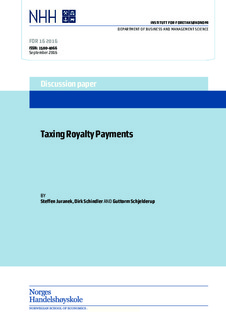| dc.description.abstract | The digital economy is characterized by the use of intellectual property such as software, patents and trademarks. The pricing of such intangibles is widely used to shift profits to low-tax countries. We analyze the role of a source tax on royalty payments for abusive transfer pricing, and optimal tax policy. First, we show that mispricing of royalty payments does not affect investment behavior by multinationals. Second, it is in the vast majority of cases not optimal for a government to set the source tax equal to the corporate tax rate. The reason is that shutting down abusive transfer pricing activities needs to be traded off against mitigating the corporate tax distortion in capital investment. The latter can be achieved by some tax deductibility of royalty payments. If the true arm's length transfer price equals zero or for special corporate tax systems that treat debt and equity alike (i.e., for ACE and CBIT), it will be optimal to equate both tax rates. | nb_NO |
